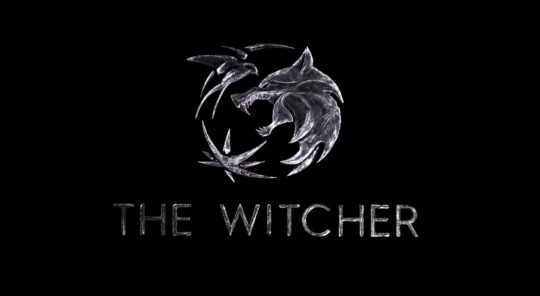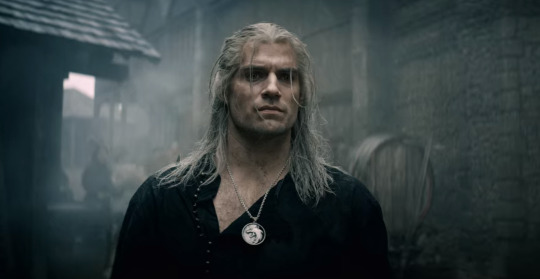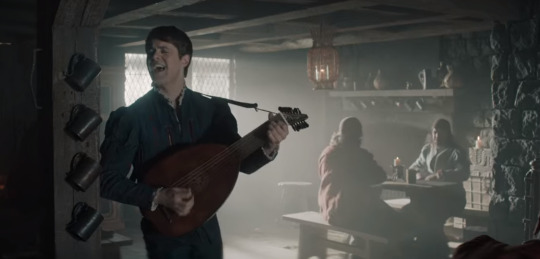#and how these ideas align with ideas of genre; and genre fiction 'versus' literary fiction
Explore tagged Tumblr posts
Note
but i like to receive the upholstery images in my head : (
make up your own upholstery images. I believe in you
#there's something interesting to be teazed out here of course about the presumed purposes of writing and reading#to create an experience versus to communicate some idea with use of craft#and how these ideas align with ideas of genre; and genre fiction 'versus' literary fiction#however as someone with no mind's eye I just simply care so little about what someone is wearing &c.
15 notes
·
View notes
Photo










A penny for my Witchery thoughts
The Witcher Netflix series was released at the tail end of last month, giving Geralt of Rivia the interesting distinction of a literary character who’s now a well-known TV protagonist but just happened to achieve international fame through video games first. (Aye, there was a Polish film and show in 2001 and 2002 which called Geralt a “Hexer” instead of a “Witcher,” but they’re not exactly good, though perhaps worth a peek on YouTube for chuckles.)
Geralt’s adventures - both in the stories written by Andrzej Sapkowski and the games developed by CD Projekt Red - are close to my heart. I’ve spilled a fair amount of digital ink writing about the franchise, and my playthrough of the games and subsequent devouring of the books from 2014 to 2016 reignited my appreciation for fantasy and served as the impetus that got me reading more genre fiction and eventually delving into tabletop RPGs in 2017, leading to my current obsession with Dungeons & Dragons. I’m naturally protective of material that means a lot to me, so when the Netflix series was announced I viewed it with only subdued optimism. After all, with the possible exception of a certain HBO thing based on George R.R. Martin’s books (which now seems to be viewed worse in retrospect after the final season), fantasy doesn’t have a great track record on the small screen. I also wasn’t especially impressed when Henry Cavill was cast as Geralt, since I primarily know him from the recent Superman movies, which paint the guy in such a dour light and force him to constantly grimace like someone who’s just taken a dump only to discover that there’s no toilet paper in sight.
But now the show’s out in the wild, and after scanning some mixed reactions (not to mention one truly baffling “review” by two Entertainment Weekly twats who only watched the first episode) I cautiously consumed it with my girlfriend over Christmas break...and can happily report that it’s good. But, it’s also a show that expects its viewers to skip through some mental hoops as we bear witness to three intersecting story lines, all of which are taking place in different eras. Then you’ve got your standard variety of fantasy names, terms and themes, several of which might be tricky to grasp if you’ve never read the books or played the games. For instance, I don’t think they ever bothered to fully explain the “Conjunction of the Spheres” (the time when planets aligned and monsters and humans came to the world, uprooting the indigenous elves and dwarves) or the “Law of Surprise” (when a person’s fate is intertwined with something unexpected - usually an unborn child). I can also see how the show’s numerous mentions of the word “destiny” could seem like wacky dialogue to viewers unaware of the fact that Sapkowski’s realm really does have a strong undercurrent of inescapable fate running through its veins.
Unique structure and terminology aside, the first episode was more of a slow burn than I’d imagined. It starts with an awesome sequence of Geralt fighting a Kikimora, but then transitions into a fairly serious interpretation of “Lesser Evil” from the first short story collection, The Last Wish. The episode then cuts into the exodus of Ciri from the kingdom of Cintra, an event mostly described in flashback in the second short story anthology, Sword of Destiny. The scenes of death and destruction as Ciri flees her burning kingdom are fairly meandering, as are the interspersed interactions between Geralt and Renfri, a woman with seven loyal followers who was supposed to be a grittier version of Snow White in the books. There are some great fights near the end, but as I watched, I couldn’t help but think that I probably would’ve made the opener speedier and a bit pulpier, especially since the tone of these early Witcher tales was more “tongue in cheek fairy tale deconstruction” than plodding epic fantasy.
The second episode also took its time, though the decision to detail the plight of Yennefer the sorceress before she uses magic to change her hunchback form into something that she sees as more conventionally attractive is a good one, since this was once again only flashback material in the novels. But the cream of the hour was certainly Jaskier the bard, who’s going by his moniker in the books rather than the “Dandelion” translation that the games used. He’s played by actor Joey Batey with a perfect blend of magnificent bastard bravado, surpassing his portrayal in the games with a larger than life theme song that’s now something of a cult phenomenon, and his characterization made me feel like the show knew what it was doing at the end of the day.
Episode three is where things truly came together for me, since we barrel straight into the Geralt versus Striga battle from Andrzej Sapkowski’s first Witcher short story. It’s a full-on horror interpretation (which I liked but my girl found too spooky), and also full-on fan service for someone like me who still watches the intro cinematic to The Witcher 1 on occasion. And in later episodes, as my head began getting used to the nuances of the three character timeline, the show seemed to find its footing with this delicate blend of fan service, pulp and seriousness. By the time episode 8 rolled around and the character arcs of Geralt, Ciri and Yennefer came full circle with the Battle of Sodden Hill - yet another event that Sapkowski mostly wrote in flashback - I found myself wishing that season two would arrive sooner than 2021, and my girlfriend felt similarly. I also realized why the showrunners decided on the unorthodox timeline - this is a series that’ll probably excel on rewatches, particularly if you already have an idea of what to look out for.
Series producer Lauren S. Hissrich (who’s quite a joy to follow on Twitter) has mentioned in interviews that this is a show that expects a tad of patience and effort from viewers, but will give a lot in exchange. I’m inclined to agree, and while this depiction of Sapkowski’s lore has some initial roughness around the edges, it ultimately reminds me of how The Witcher 1 was janky even upon its 2007 release but exhibited a unique magic to anyone who stuck with it for more than a handful of hours. Many professional reviewers tend to avoid giving fantasy shows patience and effort (Game of Thrones is an anomaly), which may explain some of the negative reviews. But The Witcher seems to have found a strong-as-nails following from audiences, who made it one of Netflix’s top efforts of 2019, and even friggin’ Anne Rice liked it. (Geralt of Rivia now possesses the other interesting distinction of being a literary character/TV protagonist/video game hero who’s been mentioned in the same breath as Lestat the vampire.)
Speaking of Geralt, I owe Henry Cavill applause. I didn’t think much of his casting, but he pulled through in the end, delivering a silver-haired hero that’s clearly influenced by the games - particularly in the voice and the occasional spell slinging - but still very much his own take, with nary a “where’s the toilet paper” grimace in sight. Audiences can now take their pick between an iconic video game interpretation of the White Wolf and a likely-soon-to-be-iconic TV version, which is a rare choice to have in fandom, especially for a franchise that was once little known outside of Poland. Toss a coin to your Witcher, indeed.
7 notes
·
View notes
Text
Writing Voice: 4 Tips for Tailoring Your Distinctive Voice
The following is an excerpt from WD Books’ new release, Writing Voice: The Complete Guide to Creating a Presence on the Page & Engaging Readers. It originally appeared in Writing With Quiet Hands by Paula Munier.
As an agent, I get very excited when I find a writer with a great voice because I know that it’s easier for a writer to learn structure than to discover her truth. I often meet talented writers who have yet to sell their stories because they have yet to find their voice—or they are fighting the truth about their voice.
Part of my job is helping my clients recognize their authentic voice and tailor it to the best commercial project for them. Let me tell you four stories about four very different clients—and how they developed a distinctive voice, used that voice to tell great stories, and got published in the process. Each story offers a different voice lesson for the perceptive writer.
All writers bring a unique set of skills to their work: One author might write outstanding characters, while another might dazzle with dialogue. You don’t have to master every aspect of the craft in order to succeed, but the one quality required of every writer is a compelling, original voice. Your voice, which is often difficult to define and even more difficult to master, can transform your writing from pedestrian to powerful.
In Writing Voice: The Complete Guide to Creating a Presence on the Page & Engaging Readers, you’ll discover effective instruction and advice from best-selling authors and instructors like Donald Maass, Adair Lara, Paula Munier, Dinty W. Moore, James Scott Bell, and many others, plus exercises, techniques, and examples for making your prose stand out, be it fiction or memoir. You’ll learn how to explore the unique way you write, study the distinctive styles of other writers, understand the importance of word choice, develop the right voice for your genre, craft excellent narration that keeps your readers coming back, choose the proper voice for your nonfiction, and more.
1. Reveal Yourself: A Cop’s Story
When I first became an agent, I was overwhelmed by queries; my first week on the job I got more than one thousand queries from writers I didn’t know, and the numbers have grown exponentially ever since. I needed an intern. (As it turns out, I always need an intern.)
I got a call from a professor friend of mine who also writes popular traditional mysteries for St. Martin’s Press. She had an MFA student who was looking for an internship. She warned me that this was not your typical grad student but rather a middle-aged writer who’d spent thirty years as a homicide detective for the Oakland Police Department. I was thrilled because (1) I represented a lot of crime fiction writers who would benefit from a cop’s perspective on their work, and (2) I’m a sucker for a good police procedural.
His name was Brian, and he rocked. He read my queries, he edited my clients’ work, and he finished his thesis, which just so happened to be a police procedural. I liked it and offered to represent him and his work. But first he had to refine his voice.
For Brian’s voice was his selling point, the leverage I needed to pitch his work when I shopped it. Cops who can write are few and far between, so when I find one, I sign him—or her—right up. But voice is a two-edged sword: Brian’s experience on the force informed every word he wrote and gave his prose a confidence and authority born of that experience. All good. But not enough. What was missing in his story was how he felt about that experience. Readers would love his cop hero—but they would love him more if they got to know more about his heart—and not just his head.
This wasn’t easy for Brian, who, like most cops, kept his feelings close to his bulletproof vest. I knew he thought I was making a big deal out of nothing. But he did what I asked (another reason I like working with former law-enforcement and military personnel, as they actually listen to me and follow my advice). He beefed up his protagonist’s inner life, and I shopped the series. Within short order, I got Brian a three-book deal. (Look for the Matt Sinclair series, by Brian Thiem, wherever you buy your books.)
The only real significant revision request from his editor: Beef up the inner life of his hero even more. (I love being right. And I love Brian.)
VOICE LESSON #1: Readers respond most to emotional honesty in a writer’s voice. Don’t be afraid to reveal yourself.
In The Writer’s Guide to Beginnings, author and literary agent Paula Munier shows you how to craft flawless beginnings that impress agents, engage editors, and captivate readers. You’ll learn how to develop the big idea of your story and introduce it on page one, structure opening scenes that encompass their own story arc, kickstart your writing with effective brainstorming techniques, and introduce a compelling cast of characters that drive the plot. You’ll also examine best-selling novels from different genres to learn the secrets that experienced writers use to dive straight into a story.
With thorough examinations of voice, point of view, setting, dialogue, and conflict, this book is a must-have tool for luring your readers in with your opening pages—and convincing them to stick around for the ride.
2. Remember Who You Are: A Novelist’s Story
I’ve known Meera for many years; we met decades ago when we were both beginning writers in San Jose. We hung out at writers conferences and participated in writers workshops and read our work aloud to each other in writers’ groups. Meera was one of the most interesting people I knew; originally a farm girl from Missouri, she’d traveled the world in search of enlightenment. When I became an acquisitions editor for a mind/body/spirit imprint, I sought out Meera to write books for the new line—and she made a career for herself as the author of nonfiction titles, wonderful how-to books on the secrets of living an authentic life.
She wrote fiction, too—fabulous stories starring the exotic people and places she’d met on her travels. While technically proficient, these stories fell flat on the page. Meera was imitating the voices of other cultures, other customs, other writers—and drowning out her own voice in the process. In the meantime, she moved to the country and settled on a little farm she called the Henny Penny Farmette in Northern California. She started blogging about her chickens, bees, and goats.
Her blog was a big hit—and the ammunition I needed to convince her to write a novel set on the Henny Penny Farmette. She’d found her fictive voice right there on the farm. (Of course, she’d never lost it; she used it when writing nonfiction. But her love of other cultures and faraway lands blinded her to it in her own storytelling.) She wrote the first in a traditional mystery series set on the farmette—and I got her a three-book deal. (Look for the Henny Penny Farmette mystery series by Meera Lester wherever you buy your books.)
VOICE LESSON #2: If you’re having trouble finding your voice, start close to home. The truth is often right under your nose.
3. Listen to the Sound of Your Own Voice: The Historian’s Story
When I first moved to Massachusetts, I had no writer friends, and even though I was working at a publishing house with book people, I missed hanging out with writers. (Editors are not the same as writers, though I love editors—especially editors who are also writers.) So I joined the online chapter of Mystery Writers of America and started interacting with the other members online.
There I bonded with fellow Rainer Maria Rilke–fan Brian Thornton, who was from the Northwest (and not the same Brian who writes police procedurals—my world is full of great writers named Brian). We became fast friends and met in person several times at writers conferences. Brian, a history teacher by day, even wrote a couple of great history-related nonfiction books for me while I was an acquisitions editor.
But what Brian really wanted to do was publish fiction. We exchanged some stories for critique. I read Brian’s modern private-eye novel and one of his historical mystery stories. I told him that he should focus on historical fiction, as his historian’s voice seemed better suited for it. Commercial historical fiction is not easy to write; only people who are passionate about it and can make it relevant to the modern reader succeed. The good news is that if you can write solid historical fiction, you can usually get published. So I wasn’t at all surprised when Brian sold his first piece, a historical short story, to Alfred Hitchcock’s Mystery Magazine. Now he’s working on a historical mystery—and now I’m an agent—so here’s hoping that he lets me shop it when he’s ready. (Did I mention that I love being right?)
VOICE LESSON #3: Capitalize on your voice’s strengths. Not only can this help refine your work, it can help you sell it.
Every fiction-writing guide offers its own set of beliefs, techniques, and methods for crafting a novel, developed from the values a particular instructor deems necessary for powerful prose. But while writers might disagree over showing versus telling or plotting versus pantsing, none would argue this: If you want to write strong fiction, you must make your readers feel. The reader’s experience must be an emotional journey that aligns with your characters’ struggles, discoveries, and triumphs.
That’s where The Emotional Craft of Fiction comes in. Veteran literary agent and expert fiction instructor Donald Maass shows you how to connect readers—viscerally and emotionally—to your characters and your story. You’ll learn how to create an emotional response through showing and telling, develop a moving narration style, understand reader expectations for a character, and more. Readers can simply read a novel … or they can experience it. If you want to give your readers an experience, start by conjuring vivid, authentic emotion on the page.
4. Do Not Confuse Voice with Plot: The Artiste’s Story
Sometimes I’m so bowled over by a writer’s talent that I ignore the lack of market potential for the work and sign the writer anyway. That’s what happened when I read Richard’s writing for the first time. Richard’s talent was obvious, and I wasn’t the only one who thought so; he’d been celebrated for his brilliant short stories. But he’d yet to break into commercial fiction with his novels.
Richard’s work was überdark—and überdark is not an easy sell. Even your True Detective stories have some (wan) light at the end of the dark tunnel of prose. I warned Richard about this, and he did some revision as requested, but he resisted my appeals to explore his not-so-darn-dark side. Eventually I caved—and I sent out the novel as it was to all the editors I knew who loved dark material. One by one they passed, saying it was just too dark, even for them. But if he wrote anything else, they’d love to see it.
I didn’t give up. (I hate giving up.) I knew that we just needed to find an editor who’d fall in love with Richard’s work the way I had. And I’m happy to say that we did; it took two years, but finally I got Richard a two-book deal with a Big Five house.
Unsurprisingly, the editor wanted a little (wan) light at the end of the dark tunnel of prose. Richard balked. The editor called me, and I called Richard. Richard was worried about “compromising his voice.” But voice really had nothing to do with it. If he found an audience, he couldn’t risk engaging them with his compelling voice only to lose them at the end of the story by refusing to make a slight shift in plot from a “so dark you can’t see” ending to a “dark but not so dark you have to slit your wrists” ending. I explained to him that the first page sells the book and the last page sells the next book. He didn’t have to change his voice; he just had to rethink the emotional impact of the ending on his reader. Leaving a bad taste in the reader’s mouth—no matter how beautiful the voice—is not the way to build an audience. (Richard Thomas’s novel Disintegration debuted to great reviews and endorsements by such literary lights as Chuck Palahniuk, Irvine Welsh, Chuck Wendig, Paul Tremblay, and more.)
VOICE LESSON #4: Voice is how you tell the story—it’s not the story itself. Be sure that you don’t compromise the emotional impact of your story to protect what you mistakenly believe is your voice.
About the Author:
Paula Munier is Senior Literary Agent and Content Strategist at Talcott Notch Literary Services. She began her career as a journalist, and along the way added editor, acquisitions specialist, digital content manager, publishing executive, author, and writing teacher to her repertoire. Paula is the author of several books, including Plot Perfect: How to Build Unforgettable Stories Scene by Scene. Her first mystery series debuts with Spare These Stones in 2018 (St. Martin’s Press).
The post Writing Voice: 4 Tips for Tailoring Your Distinctive Voice appeared first on WritersDigest.com.
from Writing Editor Blogs – WritersDigest.com http://www.writersdigest.com/editor-blogs/there-are-no-rules/excerpts/writing-voice-lessons
0 notes